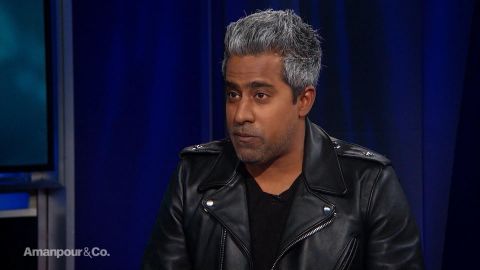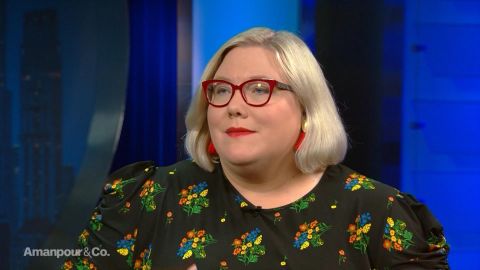Read Transcript EXPAND
CHRISTIANE AMANPOUR: So as Mikkelsen reflects on his characters’ loneliness, our next guest tackles those issues head-on. Issues often silenced and that can lead women to feel socially isolated. Lindy West confronts sexual assault with her blog “I Believe You, It is Not Your Fault.” And she tackles other issues as well including a woman’s right to choose as “New York Times'” feminism op-ed writer. To add another notch in her belt, her memoir turned T.V. series Shrill is hitting screens this March on Hulu. And she tells our Alicia Menendez why so many women’s issues are still considered taboo.
ALICIA MENENDEZ: Lindy, thank you so much for joining us.
LINDY WEST: Thank you so much for having me.
MENENDEZ: Tell me what is #ShoutYourAbortion?
WEST: #ShoutYourAbortion is a movement that I co-founded in 2015 with a friend of mine named Amelia Bonow. We were just sitting around talking about what can we do to counteract this — the Planned Parenthood sells baby parts craze that was going on at the time. And this sort of calls to defund Planned Parenthood and all of the propaganda and these really malicious false narratives that were out there about what Planned Parenthood does and about what abortion is and what people who have abortions are like. And we were just like what could we do? Should we have a, I don’t know, a storytelling night or some event where we all get together and talk about abortion. What we ended up doing was just putting our abortion stories on social media and it actually was like an instant reaction all over the world. Like — so Amelia started by writing on Facebook, “I had an abortion of the Planned Parenthood on Madison Street in Seattle and it’s an experience that I remember with nothing but gratitude basically.” And she says, “We’re supposed to believe that people who have abortions are to some degree bad people and I’m a good person and my abortion made me happy in a totally unqualified way because why would I not be happy that I was not forced to become a mother.” And I was like that is amazing. And so I screamed out Amelia’s story. I put it on Twitter. I added #ShoutYourAbortion and then I tweeted my own story.
MENENDEZ: Is that liberating?
WEST: Absolutely. Yes. I mean I haven’t talked about it in public. It was a significant moment in my life but also not, you know. It was like not traumatic. It was just sort of I was in a bad relationship. I was young, not having a child with this person. And I didn’t think about it that much but that kind of made it more significant almost. Why am I feeling like I can’t talk about this thing that’s not even a big deal to me?
MENENDEZ: There will be many people who watch this interview and are deeply uncomfortable.
WEST: Yes.
MENENDEZ: The fact that you were speaking about abortion in such a casual way. Is that part of the point?
WEST: I mean kind of. It’s not supposed to be flippant. It’s — you know, I just said — I said it’s not a big — it wasn’t a big deal. It was a big deal in certain ways and in certain ways, it wasn’t. It’s just a part of my life and it’s a part of a lot of people’s lives. One in four people who get pregnant will have an abortion at some point and that’s a huge number. And so people — a lot of people find it jarring that people assume that Shout means that we’re bragging I hear a lot, that people are bragging about our abortions or we’re celebrating our abortions, having abortion parties, whatever that means. And Shout just means the opposite of a whisper. You know, we’ve been sort of conditioned to believe in this anti-abortion stigma but it’s really a construct of the evangelical right.
MENENDEZ: And now, #ShoutYourAbortion is a book.
WEST: Yes. So my dear friend Amelia Bonow who co-founded the movement with me, she since 2015 has really picked it up and turned it into like a full-fledged organization. And their latest project is this book “ShoutYourAbortion which is an anthology of people’s stories and people’s artwork and photographs and comics just talking about people’s experiences with abortion. We have pre-row abortion stories. [13:45:00] You know, stories from religious people, stories from people who have children and chose to have an abortion, people who had to terminate wanted pregnancies. It’s a really like beautiful nuanced, you know, portrait of how complex and how important this issue is.
MENENDEZ: Do you think any part of it comes from the fact that the constitutional logic behind a woman’s right to choose ends up coming down to privacy and at the same time you’re using the word “Shout”?
WEST: The fact is that we do have the right to medical privacy and it’s not being respected. And so if being quiet and not talking about this thing and caving to this stigma which sort of tacitly endorses and validates the stigma if I’m afraid to talk about it, then maybe there must be a good reason. You know, that’s not necessarily been politically effective. You can’t really advocate for something that you can’t say out loud and when it — and that’s fine if it’s not under attack. But if the right — if the constitutional right is under attack, we have to be able to talk about the reality of abortion. And the reality of abortion is that people are having abortions all the time. They always have and they always will. And all we can control is whether or not people have access to abortion and have access to safe abortion. You know I wish that I got to exercise my right to privacy and I didn’t have to open up my personal life to the world. I would love that. You know, I would love for when we talk about sexual assault that victims didn’t have to come forward and give the world every lurid detail of the worst thing that ever happened to them in order to be believed which is what we demand that people do. You know, if you don’t give enough details, then you’re probably lying. Even if you do give enough details, people don’t believe you.
MENENDEZ: Do you think — one of the things we’ve seen in the last year is the takedown of various men. I can think of one woman who has been alleged of sexual assault and then a very quick conversation about rehabilitation – –
WEST: Yes.
MENENDEZ: — follows. How soon can it get back? I do wonder though at one point there is room for a conversation about restorative justice and if sort of justice applies in this framework?
WEST: I mean absolutely, of course. I mean I just think that, obviously, that’s a really important conversation to have. It just doesn’t feel like we ever really finish the first conversation about people who are actively being harmed, who are not being believed, whose lives are being ruined. And lives are being ruined in really subtle ways where especially workplace harassment cases, it’s not necessarily that like, “Oh my boss sexually assaulted me and then I was fired.” It’s often like a lot subtler than that. It’s like I was uncomfortable if the situation. I was made uncomfortable for a long period of time. And eventually, I left the industry and I never grew to my full potential and we will never know what happened. I mean we will never know how many of those people there are. And like there’s this massive wealth of talent and power that’s being lost. And what that does is consolidate power among men, you know, disproportionately. And so —
MENENDEZ: Do you think American society has the language to unpack that distinction?
WEST: I mean American society is very big and complicated. Some people have the language to unpack that distinction and a lot of people don’t. And it’s it’s hard. Like it’s painful. It’s a painful thing to delve into because as — I mean when MeToo was like really going, you start to discover that people you really love have done really horrible things. And you — I understand the sort of instinct to bury it and be like — and make it OK. Honestly, I understand. I mean I — and you have to push through that and you have to do what’s right and you have to let go of people that you love. Or at least, you know, enforce consequences against those people if you want to really live your values and you want to build a safer world for your kids. So —
MENENDEZ: Because that’s — that has been another point of contention which is when accusations are made against a man very often when the first things we see is a letter or a public statement of support from all of the women in his life, professional, personal. And it has put women in this precarious situation of saying this is not the person as I understand them to be.
WEST: Yes. Just like don’t sign one of those letters. I mean just — even if — I don’t know. It seems like a mad idea to send one of those letters. You know, like has he really — I don’t mean this as an excuse or as an apology [13:50:00] but this kind of gender dynamics are really deeply built into our culture. And it really, you know, has been normal for men to chase and bother women until they finally relent, you know what I mean, and consent to sex or whatever. Like that was the model for a long time. And so there are a lot of men who I think, I mean to be really charitable, didn’t know that they were violating someone’s boundaries necessarily. I don’t know if I really want to say that or if I really believe that. But to be charitable, maybe there are people who didn’t realize. But that’s still a problem that we have to deal with. And I think trying to excuse those behaviors that might be just kind of being creepy or being too forward or being too persistent, things that aren’t maybe outright assault but are still a boundary violation. We still have to deal with those. And I think, you know, wanting to jump out and say this is a good man, this man would never do this is hindering that progress. I don’t know.
MENENDEZ: Tarana Burke, founder of the MeToo Movement recently said that the movement has become unrecognizable to her. She said suddenly a movement to center survivors of sexual violence is being talked about as a vindictive plot against men.
WEST: Sure. Yes. I mean people are desperate to squirm out of accountability. It’s not even a new part of the sexual assault discourse model. You know, I mean even just for forever. When — just anyone accuses someone of rape, discrediting the accuser is like part of the trial. It’s like the lawyer’s job. So, of course, that happens on a large scale. And when we have this massive reckoning, we have this sort of institutional voice framing it that way and saying, “No, no, no, no, no. This is just women being vindictive and trying to ruin men.” And, of course, you know, the system wants to perpetuate itself. And men hold a disproportionate amount of power. And we’ve seen, you know, some powerful men fall to this sort of groundswell of energy that MeToo has brought into the discourse and that’s scary for powerful men. Because like I said, a lot of this stuff was normal for a long time and it was the way that people operated.
MENENDEZ: So you just wrapped your new show.
WEST: Yes.
MENENDEZ: Filmed a movie.
WEST: Yes.
MENENDEZ: And somehow, you have a new book that you’re also working on. What is it about?
WEST: So it’s a collection of essays about our current cultural and political moment sort of looking at how we got here. Specifically, I’m trying to delve into the way that Americans especially love to believe lies about ourselves. And we live in this sort of cocoon of fantasy. You know, even to the really — the real fundamentals of this country, the fact that we live on stolen land, the fact that we live in a nation built by slaves that white generational wealth comes from slavery, there are these like really dark realities just in the DNA of this country that we don’t look at because it’s more comfortable to believe that we did it. You know, like that we’re the land of the free and we’re like plucky adventurers. And, you know, the reality is much more complicated and much scarier to reckon with. And so it’s called The Witches Are Coming which is sort of a MeToo reference because I think things like MeToo, things like #ShoutYourAbortion, these are outbursts of truth. These are people telling the truth about what’s happened to them that they’ve been told to keep quiet and they’ve been told to participate in this sort of fictional counter-narrative where we’re all happy, we’re all working together, we’re all equal, we’re all being taken care of which is just not true. So it’s sort of about delving into those fantasies and also delving like taking a look at these movements that are trying to counter them and how — and what happens in that friction.
MENENDEZ: Lindy, thank you so much.
WEST: Thank you so much for having me.
About This Episode EXPAND
Christiane Amanpour speaks with Anand Giridharadas about why society’s global elites are to blame for world issues; and actor Mads Mikkelsen about his new movie “Arctic.” Alicia Menendez speaks with Lindy West about why women’s issues are still considered taboo.
LEARN MORE


